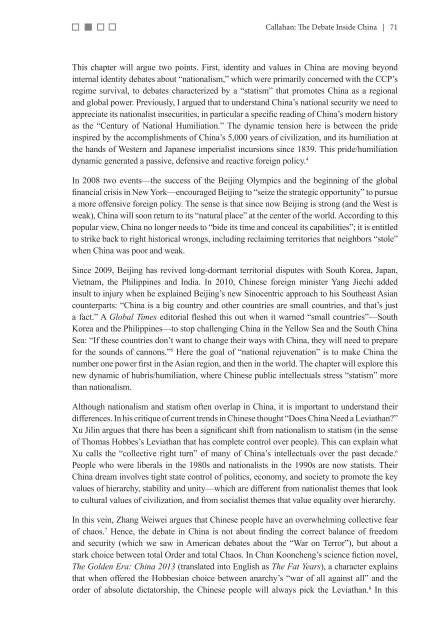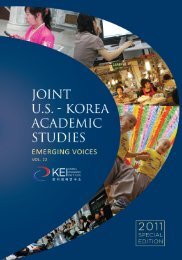the full publication PDF - Korea Economic Institute
the full publication PDF - Korea Economic Institute
the full publication PDF - Korea Economic Institute
Create successful ePaper yourself
Turn your PDF publications into a flip-book with our unique Google optimized e-Paper software.
Callahan: The Debate Inside China | 71<br />
This chapter will argue two points. First, identity and values in China are moving beyond<br />
internal identity debates about “nationalism,” which were primarily concerned with <strong>the</strong> CCP’s<br />
regime survival, to debates characterized by a “statism” that promotes China as a regional<br />
and global power. Previously, I argued that to understand China’s national security we need to<br />
appreciate its nationalist insecurities, in particular a specific reading of China’s modern history<br />
as <strong>the</strong> “Century of National Humiliation.” The dynamic tension here is between <strong>the</strong> pride<br />
inspired by <strong>the</strong> accomplishments of China’s 5,000 years of civilization, and its humiliation at<br />
<strong>the</strong> hands of Western and Japanese imperialist incursions since 1839. This pride/humiliation<br />
dynamic generated a passive, defensive and reactive foreign policy. 4<br />
In 2008 two events—<strong>the</strong> success of <strong>the</strong> Beijing Olympics and <strong>the</strong> beginning of <strong>the</strong> global<br />
financial crisis in New York—encouraged Beijing to “seize <strong>the</strong> strategic opportunity” to pursue<br />
a more offensive foreign policy. The sense is that since now Beijing is strong (and <strong>the</strong> West is<br />
weak), China will soon return to its “natural place” at <strong>the</strong> center of <strong>the</strong> world. According to this<br />
popular view, China no longer needs to “bide its time and conceal its capabilities”; it is entitled<br />
to strike back to right historical wrongs, including reclaiming territories that neighbors “stole”<br />
when China was poor and weak.<br />
Since 2009, Beijing has revived long-dormant territorial disputes with South <strong>Korea</strong>, Japan,<br />
Vietnam, <strong>the</strong> Philippines and India. In 2010, Chinese foreign minister Yang Jiechi added<br />
insult to injury when he explained Beijing’s new Sinocentric approach to his Sou<strong>the</strong>ast Asian<br />
counterparts: “China is a big country and o<strong>the</strong>r countries are small countries, and that’s just<br />
a fact.” A Global Times editorial fleshed this out when it warned “small countries”—South<br />
<strong>Korea</strong> and <strong>the</strong> Philippines—to stop challenging China in <strong>the</strong> Yellow Sea and <strong>the</strong> South China<br />
Sea: “If <strong>the</strong>se countries don’t want to change <strong>the</strong>ir ways with China, <strong>the</strong>y will need to prepare<br />
for <strong>the</strong> sounds of cannons.” 5 Here <strong>the</strong> goal of “national rejuvenation” is to make China <strong>the</strong><br />
number one power first in <strong>the</strong> Asian region, and <strong>the</strong>n in <strong>the</strong> world. The chapter will explore this<br />
new dynamic of hubris/humiliation, where Chinese public intellectuals stress “statism” more<br />
than nationalism.<br />
Although nationalism and statism often overlap in China, it is important to understand <strong>the</strong>ir<br />
differences. In his critique of current trends in Chinese thought “Does China Need a Leviathan”<br />
Xu Jilin argues that <strong>the</strong>re has been a significant shift from nationalism to statism (in <strong>the</strong> sense<br />
of Thomas Hobbes’s Leviathan that has complete control over people). This can explain what<br />
Xu calls <strong>the</strong> “collective right turn” of many of China’s intellectuals over <strong>the</strong> past decade. 6<br />
People who were liberals in <strong>the</strong> 1980s and nationalists in <strong>the</strong> 1990s are now statists. Their<br />
China dream involves tight state control of politics, economy, and society to promote <strong>the</strong> key<br />
values of hierarchy, stability and unity—which are different from nationalist <strong>the</strong>mes that look<br />
to cultural values of civilization, and from socialist <strong>the</strong>mes that value equality over hierarchy.<br />
In this vein, Zhang Weiwei argues that Chinese people have an overwhelming collective fear<br />
of chaos. 7 Hence, <strong>the</strong> debate in China is not about finding <strong>the</strong> correct balance of freedom<br />
and security (which we saw in American debates about <strong>the</strong> “War on Terror”), but about a<br />
stark choice between total Order and total Chaos. In Chan Kooncheng’s science fiction novel,<br />
The Golden Era: China 2013 (translated into English as The Fat Years), a character explains<br />
that when offered <strong>the</strong> Hobbesian choice between anarchy’s “war of all against all” and <strong>the</strong><br />
order of absolute dictatorship, <strong>the</strong> Chinese people will always pick <strong>the</strong> Leviathan. 8 In this










